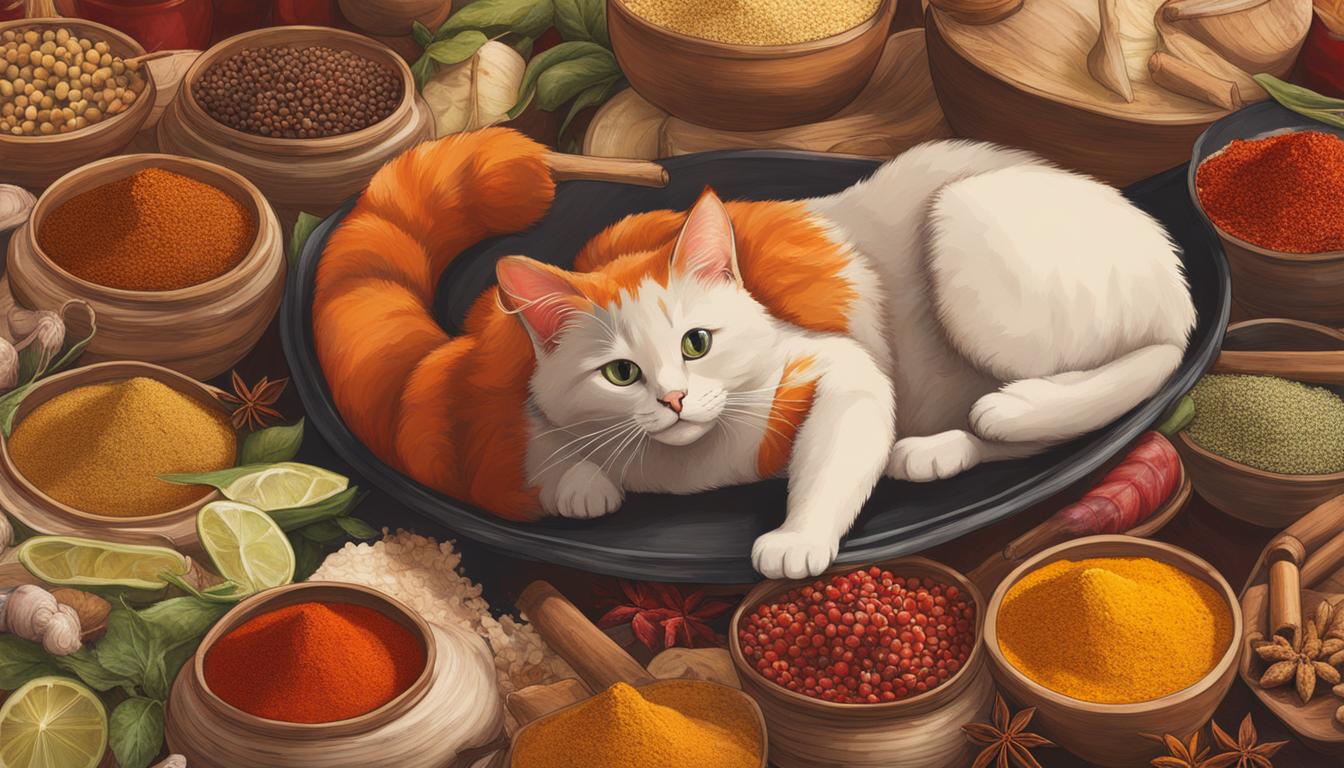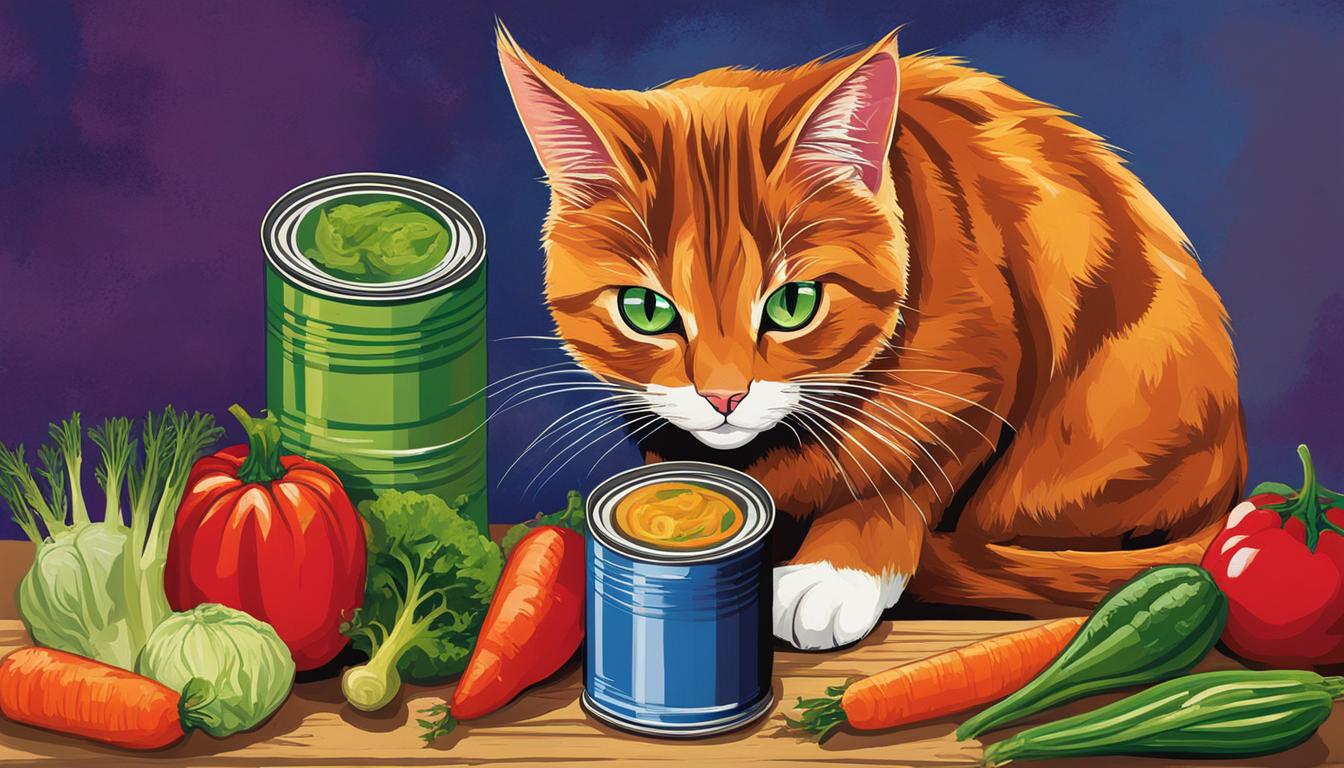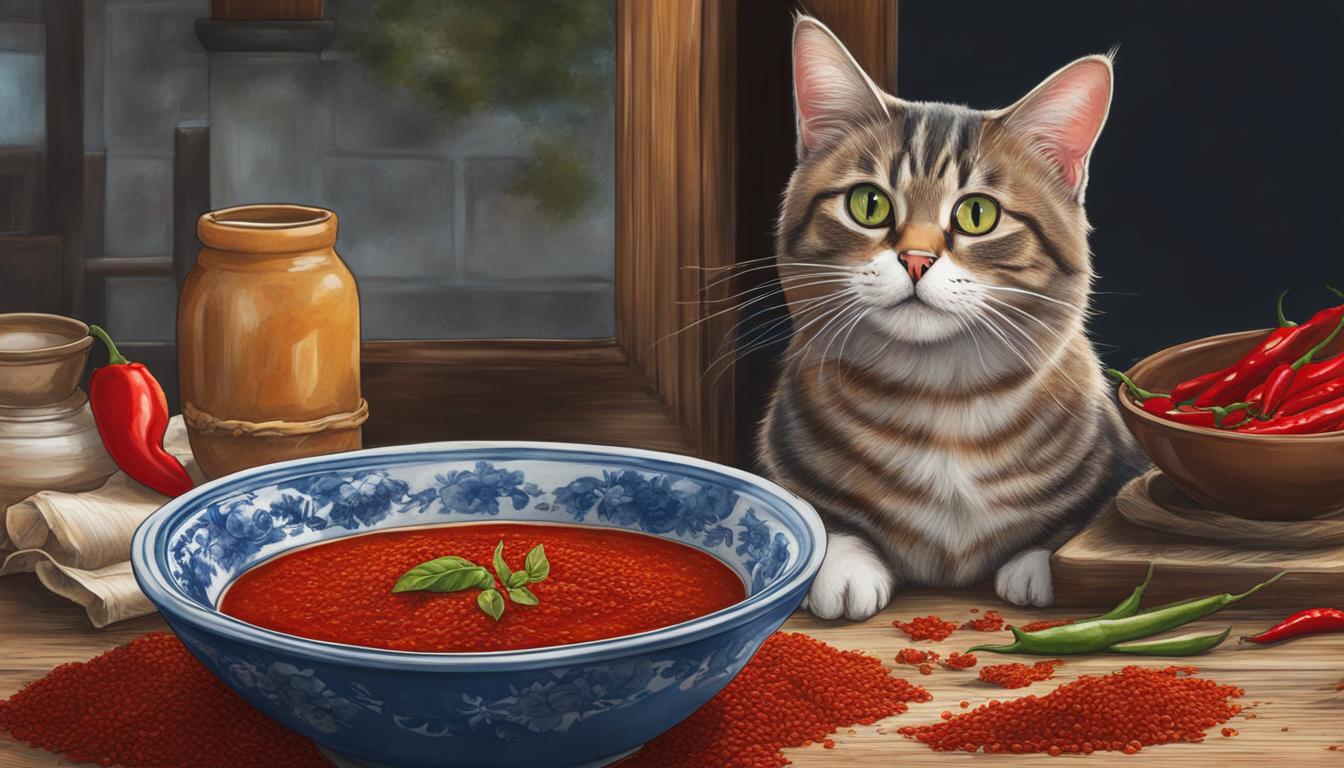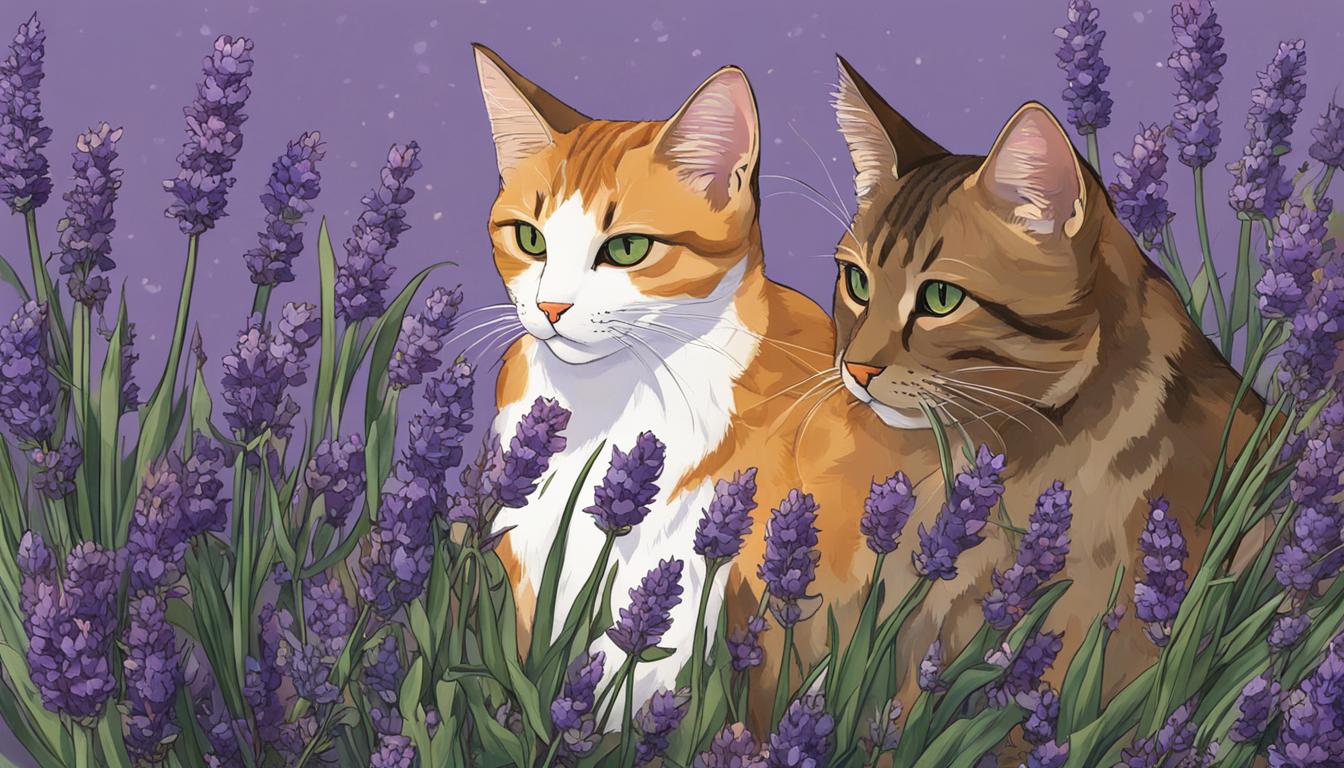Hey there, fellow cat lovers! Today, I want to dive into a burning question: Can cats indulge in the tantalizing world of spicy foods? As much as we may enjoy a fiery kick in our meals, feline dietary needs are a whole different ballgame. So, let’s unravel the effects of spices on our furry friends and find out if spicy foods are safe for cats.
Now, before we sprinkle those mouth-watering spices on our cat’s food, it’s important to understand that our little feline pals have sensitive tummies and taste buds. While spicy foods might not be explicitly dangerous, they can wreak havoc on a cat’s digestive system and cause mouth irritation. You wouldn’t want your precious kitty to suffer from tummy troubles, would you?
Key Takeaways:
- Spicy foods can upset a cat’s stomach and irritate their mouth.
- Cats’ digestive systems are not designed to handle spicy foods, leading to potential vomiting and diarrhea.
- Capsaicin, found in many spicy foods, can cause a burning sensation in a cat’s mouth.
- Some commonly used spices like onions, garlic, nutmeg, and cinnamon can be hazardous to cats.
- Opt for a quality, age-appropriate commercial feline diet to ensure your furry friend receives all the necessary nutrients.
Can Cats Taste Spicy Food?
When it comes to spicy food, cats have a unique relationship with taste. While it’s not entirely clear if cats can taste spiciness in the same way humans do, their sense of taste is different from ours. Cats have fewer taste buds and cannot detect sweet flavors, but they can recognize bitter, salty, and sour flavors to some extent. This means that while cats may not experience the full flavor of spicy foods, they can still detect the presence of spicy flavors. However, their taste buds are not as sensitive as ours, so they may not have the same level of sensitivity to the heat of spices like capsaicin.
Cats’ sensitivity to spicy foods goes beyond taste. Even if they can’t fully taste the spiciness, their digestive systems and mouths can still be affected. Capsaicin, the compound responsible for the heat in peppers, can cause a burning sensation and mouth irritation in cats. This is because cats do not have the same level of tolerance for capsaicin as humans do. While some cats may be attracted to the strong aromas of spicy foods, it’s important to remember that their diets should primarily consist of nutritionally balanced cat food to ensure their health and well-being.
“While we don’t know for sure if cats can taste spicy food, their sense of taste is different from humans.”
To better understand the feline sensitivity to spices, let’s take a look at a comparison table:
| Spice | Feline Sensitivity | Human Sensitivity |
|---|---|---|
| Capsaicin (found in peppers) | Causes mouth irritation and burning sensation | Can experience the heat but with higher tolerance |
| Onions and garlic | Dangerous for cats, can cause anemia | Flavorful ingredients commonly used in cooking |
| Nutmeg, cinnamon, cloves, and allspice | Hazardous for cats | Common spices used in a variety of dishes |
| Salt | Excessive consumption can be dangerous | Often used as a seasoning, but excessive intake can lead to health issues |
As seen in the table above, cats have a lower tolerance for certain spices compared to humans. This is why it’s important to avoid feeding cats spicy foods that may contain toxic ingredients or cause harm to their digestive system. While small amounts of spices may not be immediately harmful, it’s best to prioritize a quality, age-appropriate commercial feline diet that meets all their nutritional needs. Treats should also be offered in moderation, with a focus on safe human foods such as cooked meat or fish, and avoiding raw or potentially harmful ingredients.
When Spicy Food Turns Toxic
While spicy foods may not be inherently dangerous for cats, certain spices can be toxic and harmful to their health. It’s important to be aware of these harmful spices and avoid feeding them to your feline friend.
Onions and garlic, as well as spices or blends made with onion and garlic powder, are particularly hazardous for cats. These ingredients can cause anemia in cats, leading to weakness, lethargy, and even organ damage. Nutmeg, cinnamon, cloves, and allspice are other common spices used in cooking that can be toxic to cats when consumed in large quantities.
Table: Harmful Spices for Cats
| Spice | Toxic Effects |
|---|---|
| Onions and garlic | Cause anemia |
| Nutmeg, cinnamon, cloves, and allspice | Can be toxic in large quantities |
In addition to specific spices, excessive salt intake can also be dangerous for cats. Cats have a low tolerance for salt, and consuming too much can lead to dehydration, kidney problems, and even salt poisoning.
It’s crucial to keep your cat away from any foods or spices that contain these toxic ingredients. When offering treats or making homemade cat food, always ensure that the ingredients are safe and free from harmful spices.
Bland But Safe: The Right Diet for Your Cat
When it comes to the dietary needs of cats, it’s important to provide them with a quality, age-appropriate commercial feline diet. Cats are obligate carnivores, which means they require a diet that is high in protein and low in carbohydrates. This ensures that they receive the essential nutrients they need for optimal health.
Choosing the right cat food is crucial for maintaining your cat’s well-being. Look for a nutritionally balanced cat food that provides all the vitamins and minerals your cat needs. Avoid adding any additional spices or ingredients to your cat’s diet, as they may not be suitable for feline consumption. While some spices can be healthy for cats, it’s best to rely on a commercially prepared cat food to ensure proper nutrition.
Table:
Safe Spices in Cat Food
While some spices can be safe for cats, it’s important to remember that their primary source of nutrition should come from a complete and balanced cat food. Treats can be given occasionally, but they should not make up a significant portion of your cat’s diet. If you do want to provide your cat with a special treat, consider offering small amounts of cooked meat or canned fish as an occasional indulgence.
By prioritizing your cat’s health and providing them with a nutritionally balanced diet, you can ensure that they thrive and live a happy, healthy life. Remember to consult with your veterinarian if you have any concerns about your cat’s diet or if you’re considering adding any new spices or ingredients to their meals.
What About Treats?
If you’re looking to give your furry friend a special treat, it’s important to choose safe and healthy options. While cats may be curious about the enticing aroma of spicy foods, it’s best to avoid feeding them directly. However, there are other tasty treats that cats can enjoy without putting their health at risk.
Can cats eat curry? While curry may have a tempting blend of spices, it’s best to steer clear of offering it to your cat. Many curry recipes contain ingredients such as onions, garlic, and potentially spicy peppers, which can be harmful to your feline companion. These ingredients can cause digestive upset and even lead to more serious health issues.
Instead, consider giving your cat treats that are safe and beneficial for their well-being. Cooked meat, such as plain, unseasoned chicken or turkey, can be a delicious and healthy option. Just remember to remove any bones and avoid using seasonings or spices that may be harmful to cats.
“Cooked meat, such as plain, unseasoned chicken or turkey, can be a delicious and healthy option for your feline friend.”
If you’re looking to add a little variety to your cat’s treats, you can also offer small portions of canned fish, like tuna or salmon, as long as it doesn’t contain any added spices or seasonings. Cooked grains like oats can also be a safe and nutritious addition to your cat’s treat options. Fruits like cantaloupe and banana can be given in small amounts, but always make sure to remove any seeds or peels.
| Treat Option | Description |
|---|---|
| Cooked Meat | Plain, unseasoned chicken or turkey without bones |
| Canned Fish | Tuna or salmon without added spices or seasonings |
| Cooked Grains | Oats or other cooked grains |
| Fruits | Small amounts of cantaloupe or banana, without seeds or peels |
Remember, treats should only make up a small portion of your cat’s overall diet, usually no more than 10-15% of their total daily calorie intake. It’s essential to prioritize your cat’s health and well-being by providing them with a balanced and nutritionally complete diet, primarily consisting of a quality commercial cat food that meets their specific dietary needs.

Why Cats May Be Attracted to Spicy Aromas
Cats have a highly developed sense of smell, which plays a crucial role in their hunting instincts. The strong aromas of spicy foods may be appealing to cats because they mimic the scent of prey that cats would naturally hunt in the wild. Their sensitive noses can detect these enticing smells and pique their curiosity.
However, while cats may be attracted to the intense aromas of spices, it’s important to note that their preferences may not necessarily align with what is safe or suitable for their digestive systems. Cats are obligate carnivores, meaning their bodies are designed to derive essential nutrients from animal-based proteins, rather than the spices or plant-based ingredients commonly found in human foods.
Despite their attraction to spicy aromas, cats may not enjoy the taste of these foods due to their unique taste buds. Cats have fewer taste buds than humans and do not possess a specific receptor for tasting sweetness. Therefore, while they may be initially drawn to the smell of spicy foods, they may not find the flavors as appealing as their human counterparts do.
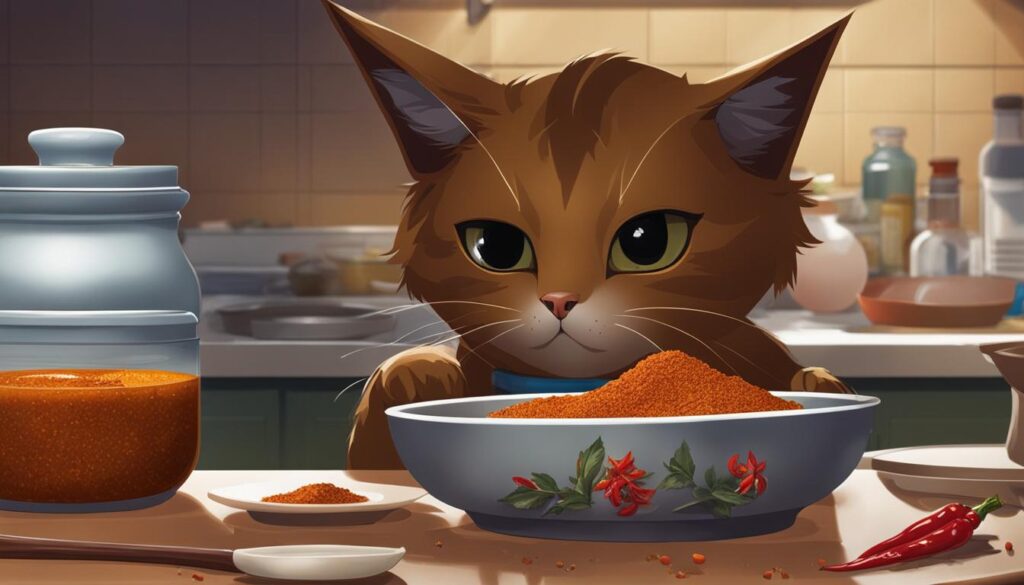
Understanding Feline Spice Intolerance
Additionally, it’s important to consider that some cats may have a low tolerance for certain spices due to their individual digestive systems. Cats have a shorter digestive tract compared to humans, which may lead to differences in how they process and metabolize certain foods, especially those with strong and pungent flavors.
Spicy foods can irritate a cat’s stomach and potentially cause gastrointestinal issues such as vomiting or diarrhea. The presence of capsaicin, the compound responsible for the heat in peppers, can also cause a burning sensation in a cat’s mouth, leading to discomfort and reluctance to consume spicy foods.
| Common Spices | Potential Effects on Cats |
|---|---|
| Onions and Garlic | Can cause anemia and damage to red blood cells. |
| Nutmeg, Cinnamon, Cloves, and Allspice | Potentially toxic and can lead to various health issues. |
| Salt | Excessive intake can be harmful to a cat’s health. |
To ensure the well-being of your feline companion, it is best to prioritize a nutritionally balanced cat food that meets their specific dietary needs. These commercial feline diets are formulated to provide the necessary nutrients and are less likely to cause any adverse reactions or discomfort. When offering treats or occasional human foods, stick to safe options such as cooked meat or fish, and avoid spicy or potentially harmful ingredients.
Conclusion
After delving into the topic of cats and spiced foods, it’s clear that while cats can technically eat small amounts of spicy foods, it’s generally not recommended. The effects of spices on cats can range from upset stomachs and mouth irritation to potentially harmful reactions caused by toxic ingredients. Cats have distinct taste buds and digestive systems that aren’t designed to handle the heat of spices like humans can.
Instead of spicing up your cat’s meals, it’s best to prioritize their health and well-being by offering them a quality, age-appropriate commercial feline diet. This will provide them with the necessary nutrition and balance they need to thrive. And remember, when it comes to treats, opt for safe human foods like cooked meat, fish, or even some fruits in moderation, always keeping in mind the overall nutritional needs of your feline friend.
While the alluring scents of spicy foods may attract your cat due to their highly developed sense of smell, it’s important to recognize that their diets should primarily consist of cat-specific nutrition. So, resist the temptation to share your spicy delicacies and instead focus on providing your feline companion with a diet that meets their unique requirements.
FAQ
Can cats eat spicy foods?
Spicy foods can upset a cat’s stomach and irritate their mouth. It’s best to avoid giving cats spicy foods and to stick to a quality, age-appropriate commercial feline diet.
Can cats taste spicy food?
Cats can recognize bitter, salty, and sour flavors but not sweet ones. While we don’t know for sure if cats can taste spicy food, they can still experience digestive issues and mouth irritation from spicy foods.
Are there any spices that are toxic to cats?
Yes, onions, garlic, nutmeg, cinnamon, cloves, and allspice are hazardous to cats. It’s important to avoid feeding cats any foods that contain these toxic ingredients.
What is the ideal diet for cats?
Cats do best on a diet high in protein and low in carbohydrates, with a moderate amount of fat. Choose a cat food that is nutritionally balanced for long-term feeding.
Can cats have treats?
Safe human foods like cooked meat, canned or cooked fish, cooked grains, and certain fruits can be given to cats as treats. However, treats should make up no more than 10-15% of a cat’s total daily calorie intake.
Why are cats attracted to spicy aromas?
Cats have a highly developed sense of smell and may be attracted to strong-smelling foods because they mimic the scent of prey. However, cats may not actually enjoy the taste of spicy foods due to their unique taste buds and digestive systems.
What is the conclusion regarding cats and spicy foods?
Spicy foods can upset a cat’s stomach and irritate their mouth, and may contain toxic ingredients. It’s best to stick to a quality, age-appropriate commercial feline diet and avoid giving cats spicy foods.

